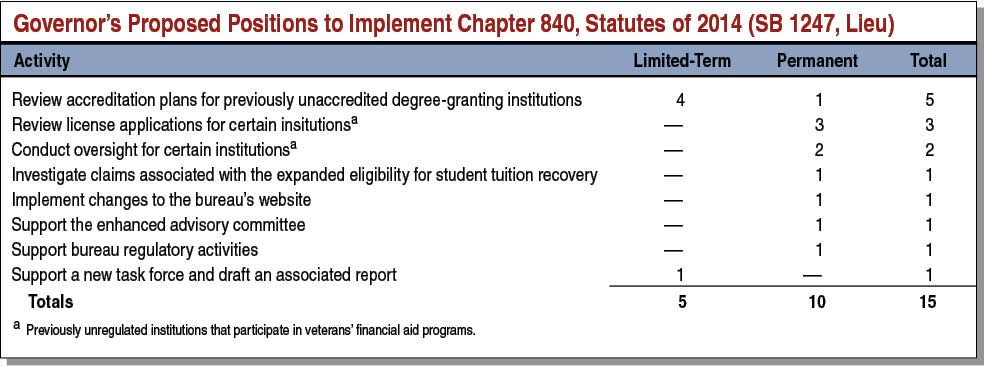2015
Other Budget Issues
| Last Updated: | 3/6/2015 |
| Budget Issue: | Enhancing bureau oversight of private postsecondary institutions. |
| Program: | Department of Consumer Affairs, Bureau of Private Postsecondary Education |
| Finding or Recommendation: | Modify the administration's proposal to make limited-term two of the three positions proposed for processing applications from institutions that are newly subject to BPPE oversight. |
Further Detail
Background
Bureau of Private Postsecondary Education (BPPE). The BPPE was created in 2009 under the Department of Consumer Affairs (DCA) to oversee most of the state’s private postsecondary schools, including nationally accredited schools, unaccredited schools, and various specialized schools. (Certain categories of institutions were exempted from BPPE oversight, such as those institutions that are regionally accredited.) The BPPE was charged with ensuring minimum educational quality standards, providing students with an effective complaint resolution process, and preventing public deception associated with fraudulent or substandard degrees.
BPPE Has Faced Challenges Meeting Statutory Requirements. Since its creation, BPPE has struggled to meet some of its statutory requirements. A 2013 audit by the California State Auditor concluded that BPPE has consistently failed to meet its responsibility to protect the public’s interests. Among other findings, the auditor identified several specific concerns, including (1) a backlog of more than 1,100 license applications, (2) challenges proactively identifying and effectively sanctioning unlicensed institutions, (3) failure to respond to complaints against institutions in a timely fashion, and (4) a backlog of more than 470 claims by students to recover tuition from institutions that closed while they were enrolled.
Recently Enacted Requirements on BPPE. In 2014, the Legislature enacted various changes designed to improve BPPE operations. Specifically, Chapter 840, Statutes of 2014 (SB 1247, Lieu) requires that (1) certain institutions that participate in veterans’ financial aid programs obtain bureau approval to operate; (2) all degree-granting institutions in the state obtain accreditation and submit their accreditation plans for bureau approval; (3) eligibility be expanded for students to file tuition recovery claims; (4) BPPE staff receive additional training; (5) BPPE post additional information to its website; (6) the composition and functions of the bureau’s advisory committee be modified and that the committee meet more frequently; and (7) BPPE adhere to additional reporting requirements.
Governor’s Proposal
The Governor’s budget includes $1.9 million from the Private Postsecondary Education Administration Fund (funded by fees charged to licensed institutions) and 15 new positions (ten permanent and five limited-term) to implement the various provisions of Chapter 840. For example, five positions would review accreditation plans for previously unaccredited degree-granting institutions, and three permanent positions would review license applications for previously unregulated institutions that participate in veterans’ financial aid programs. The remaining seven positions would perform a variety of activities, such as investigating claims associated with the expanded eligibility for student tuition recovery and implementing changes to the bureau’s website. The figure below displays the positions requested by activity. The Governor’s proposal also includes funding for staff training and a study to review existing reporting requirements for private postsecondary institutions.

LAO Assessment—Some Workload Is Temporary
We find that the most of the resources requested by BPPE are reasonable and would help implement Chapter 840. However, most of the workload associated with processing applications from institutions that are newly subject to BPPE oversight because they participate in veteran’s financial aid programs would likely be temporary in nature. The bureau estimates that 140 institutions that participate in veterans’ financial aid programs will have to apply for BPPE approval during 2015-16 because Chapter 840 requires these institutions to seek approval by January 1, 2016. We find that the bureau’s estimate that it will need three positions to review these applications during the budget year is reasonable. After initial approval, however, we expect the approval-related workload associated with these institutions to decline significantly. We expect some level of ongoing workload, largely consisting of processing renewal applications for these institutions. Thus, we find that only one of the three proposed positions to process applications for institutions newly subject to BPPE oversight is justified on an ongoing basis.
LAO Recommendations
We recommend modifying the proposal to make limited-term two of the three positions proposed for processing applications from institutions that are newly subject to BPPE oversight because they participate in veteran’s financial aid programs. We recommend that these positions be two-year limited term to reflect the expected decline in approval workload for these institutions after 2016-17. For the remaining positions proposed by the Governor, we recommend approval.